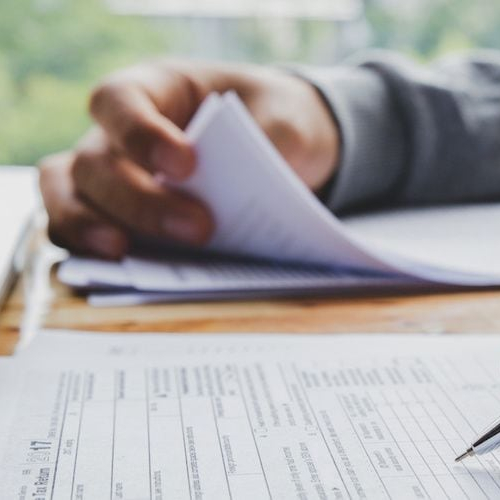How to find liens on a property: A home buyer's guide
Nov 9, 2024
•6-minute read
Imagine you’re spending ages looking for your dream home — you check out all the real estate websites, you dutifully go to open houses, and you spend all your spare time searching for that perfect place. Finally, you find what seems to be the ideal property … but then you learn that there’s a lien on it.
To put it simply, that’s not a good thing — and here’s why: liens are attached to the property, not the owner. So any obligations on a piece of property stay with that property. That’s a challenge you simply don’t want to deal with.
To avoid this vexing situation, it’s critical that you do your due diligence to learn how to find whether there are any liens on a piece property. If you take the right steps, you can ensure that there aren’t any outstanding liens on your potential home — and get rid of them if they exist. How do you do this?
Read on to find out.
You can search for liens on a property through the local county recorder, assessor or the courthouse either online, in person or by mail. Fees vary by county. You can also pay a title search company to find liens on a property.
What is a lien on a property?
When we talk about liens on homes, we are largely talking about property liens. A property lien is essentially a legal claim against property that helps ensure the homeowner will repay a debt.
For example, if you have a mortgage, that means you have a lien on your property until it is paid off. In other words, mortgages or property tax liens are attached to the property on which the mortgage or taxes are owed. Similarly, personal property such as a car might have a lien on it if you are still paying off its loan.
Types of liens
There are different types of liens on property. They include:
- Mortgage lien: This lien is applied to a property as long for as long as the mortgage exists. It is placed on a property's title when someone borrows money to buy a home, and it stays there until the mortgage balance equals zero.
- Income tax liens: When you don't pay your income taxes, the government can put a tax lien on your possessions, giving them first rights to your property if you try to sell it. Similarly, if you fall behind on your property taxes, your local government can put a lien on your house, meaning they get paid first from any sale proceeds before you see a dime.
- Property tax lien: This lien is essentially a claim on a piece of property for an amount owed in unpaid taxes. It is generated when the owner fails to pay their property taxes, and the lien itself can be sold to the highest bidder to recover the amount that’s owed.
- Judgment lien: If someone successfully sues you in court and wins the case, they can obtain a judgment lien that essentially gives them the right to take your property or assets. This lien remains on your property until you either pay what you owe or the lien expires under your state's laws.
How to find a lien on a property
If you’re buying a property, you’ll want to be sure there is not a lien on this particular parcel. Ensuring this is the case can be a labor-intensive process, but it’s well worth the effort in the end. You will end up working with governmental bodies like the county recorder, who will help you determine the property’s lien status.
This process also means you’ll need to conduct a free lien search on the tax liens public record, which will give you the relevant information. You’ll end up researching the chain of title, which provides insight into the historical transfers of a property’s title dating back to the original owner.
Steps you’ll need to take to research your property include:
1. Search public records
Thankfully, the public records process is pretty straightforward, as most counties allow you search their records online through the county recorder's or assessor's office website. While these searches are usually free, you might end up paying a nominal fee if you want to make official copies of relevant documents. (A thought on that: It never hurts to pay a little more to get the official documents, to make sure every “i” is dotted and “t” is crossed.)
If you want to be very thorough, though, you might want to bring in “a title abstractor,” a professional who knows exactly where to look for any liens or legal claims on a property. A title abstractor’s sole duty is to dig through all the public records to create an "abstract of title," which is essentially a detailed history of the property. This history will provide detailed insight, including who owned the property before, any ongoing legal issues, and whether there are any special arrangements on the property, like easements.
2. Get a title search
This type of search confirms who legally owns the property. During the course of the title search, you will also find whether there are any claims or liens against the property in question, which is a critical part of homeownership.
3. Check your credit report
Property liens typically appear on credit reports, so look in the public records section of your report to see if there are any existing liens. Tax liens, however, do not appear there as of April 2018. So be sure check your credit report to assess your status, although that should be just one part of a comprehensive search.
4. Work with a real estate agent
Working with a real estate agent to find liens is largely straightforward — simply ask them to run a title search through their title company connections. A good agent will often do this as part of due diligence when helping you evaluate a property, as they want to ensure you’re making a sound investment.
Missing a lien could mean you suddenly find yourself in unexpected debt that could equal thousands, so this simple check with your agent helps protect your investment and prevents costly surprises during closing.
How to remove a lien on a property
Having a lien on your property can create complications, so it should be a top priority to remove it. Because, as previously noted, the lien is attached to the property — no matter who owns it. So here’s how you get rid of it:
1. Pay off the lien
Paying off a lien on your property — especially the lien isn’t yours — should be a top priority. Unsurprisingly, there is a simple way to get rid of lien on a property: pay it off. That method is, of course, easier said than done, but it is crucial. Once that’s done, the lien holder should file a release with the county recorder's office.
If you’re interested in a property that has a lien, you should insist that all liens be cleared before closing and make sure your purchase agreement specifically addresses how they'll be handled. Work with a title company to verify the liens are properly released, and be wary if a seller suggests dealing with liens after the sale — that’s a significant red flag.
2. File a dispute
To dispute a property lien, start by gathering documentation that proves why the lien is invalid, such as payment records or evidence that proper procedures weren't followed when the lien was filed. You can file a formal dispute with your county recorder's office, and you may need to schedule a hearing where you can present your evidence and argue your case. If you believe the lien was filed wrongfully or fraudulently, consider working with a real estate attorney who can help navigate the legal process and potentially file a lawsuit to have the lien removed.
3. Request a lien release
If you've paid off a lien but it's still showing up on your property records (it happens), you can request a lien release form, which is sometimes called a "satisfaction of lien" or "release of lien.” Once you receive this signed and notarized form, file it with your county recorder's office to officially clear the lien from your property's title. If the original lien holder is unresponsive or no longer in business, you may need to provide proof of payment and file an affidavit with the county recorder's office explaining the situation.
The bottom line
Because a lien stays with the property regardless of who owns it, finding and resolving any lien issues is a critical part of purchasing a home. Fortunately, there are several ways to find out if a property has a lien and resolve any relevant problems. The key is doing your due diligence before purchasing, and that also includes having a mortgage ready to work with. So be sure to apply for a mortgage with Rocket Mortgage® today, to make sure you have our expertise and award-winning customer service on your side.

Joel Reese
Joel Reese is a freelance writer who has written about real estate, higher education, sports, and myriad other subjects. He has been published in The Best American Sports Writing series, Details, Spin, Texas Monthly, Huffington Post, Chicago magazine, and many other outlets. His website, ReeseWrites.net, features several samples of his work.
Related resources

5-minute read
What is a warranty deed?
When you buy a home, you want to be sure that no one but you and your lender hold claim to the property. Find out how a warranty deed protects you.
Read more

6-minute read
How are mortgage rates and inflation related?
When inflation increases, interest rates on new mortgages and ARMs increase too. Learn more about the relationship between inflation and mortgage rates.
Read more

8-minute read
Mortgage interest deduction: A guide for the 2025 tax year
Learn how the 2025 mortgage interest deduction works, what qualifies, and whether itemizing or the standard deduction saves you more.
Read more